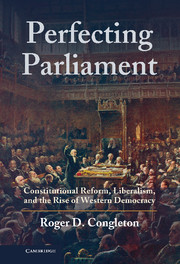Book contents
- Frontmatter
- Contents
- Preface
- 1 On the Origins of Western Democracy
- Part I Sharing Sovereignty
- 2 Team Production, Organization, and Governance
- 3 Organizational Governance in the Long Run
- 4 The Origins of Territorial Governance
- 5 Constitutional Exchange and Divided Governance
- 6 The Power of the Purse and Constitutional Reform
- 7 Suffrage without Democracy
- 8 Ideology, Interest Groups, and Adult Suffrage
- Part II Historical Evidence on Western Democratic Transitions
- Part III Analytical History as Social Science
- Appendix Methodological Approach, Limits, and Extensions
- References
- Index
4 - The Origins of Territorial Governance
Published online by Cambridge University Press: 05 June 2012
- Frontmatter
- Contents
- Preface
- 1 On the Origins of Western Democracy
- Part I Sharing Sovereignty
- 2 Team Production, Organization, and Governance
- 3 Organizational Governance in the Long Run
- 4 The Origins of Territorial Governance
- 5 Constitutional Exchange and Divided Governance
- 6 The Power of the Purse and Constitutional Reform
- 7 Suffrage without Democracy
- 8 Ideology, Interest Groups, and Adult Suffrage
- Part II Historical Evidence on Western Democratic Transitions
- Part III Analytical History as Social Science
- Appendix Methodological Approach, Limits, and Extensions
- References
- Index
Summary
Two meanings of the term “government” are common in English. One refers to the decision-making or policy-making part of a formal organization. Every club, nonprofit organization, and firm has a government in this sense, for reasons explained in the previous two chapters. These policy-making bodies devise and enforce rules for their team members in order to solve team-production problems and direct an organization’s resources to specific purposes. The other meaning of the term refers to the subset of organizations that have extensive ability to impose rules on persons within a particular geographical territory. Chapter Four provides an explanation for how the former can become the latter.
All organizations can impose rules on their own team members because realizing the fruits of team production normally requires team members to perform certain tasks at particular times with particular persons in a particular manner. The range of behaviors that can be induced by organizations varies substantially, but many organizations exercise significant control over their members. An organization’s management is often able to tell team members how to dress, when and what to eat, when and how to work, and even who their friends should be (other team members). The organization’s management may induce team members to go on trips far away from families and friends (as with hunting clubs, commercial transport shipping, and military operations), via means and to settings that involve risks to life and limb. They may induce persons to sacrifice the necessities of life for a period – fasting and abstinence, for example, are often required for the members in religious organizations.
- Type
- Chapter
- Information
- Perfecting ParliamentConstitutional Reform, Liberalism, and the Rise of Western Democracy, pp. 77 - 96Publisher: Cambridge University PressPrint publication year: 2010



